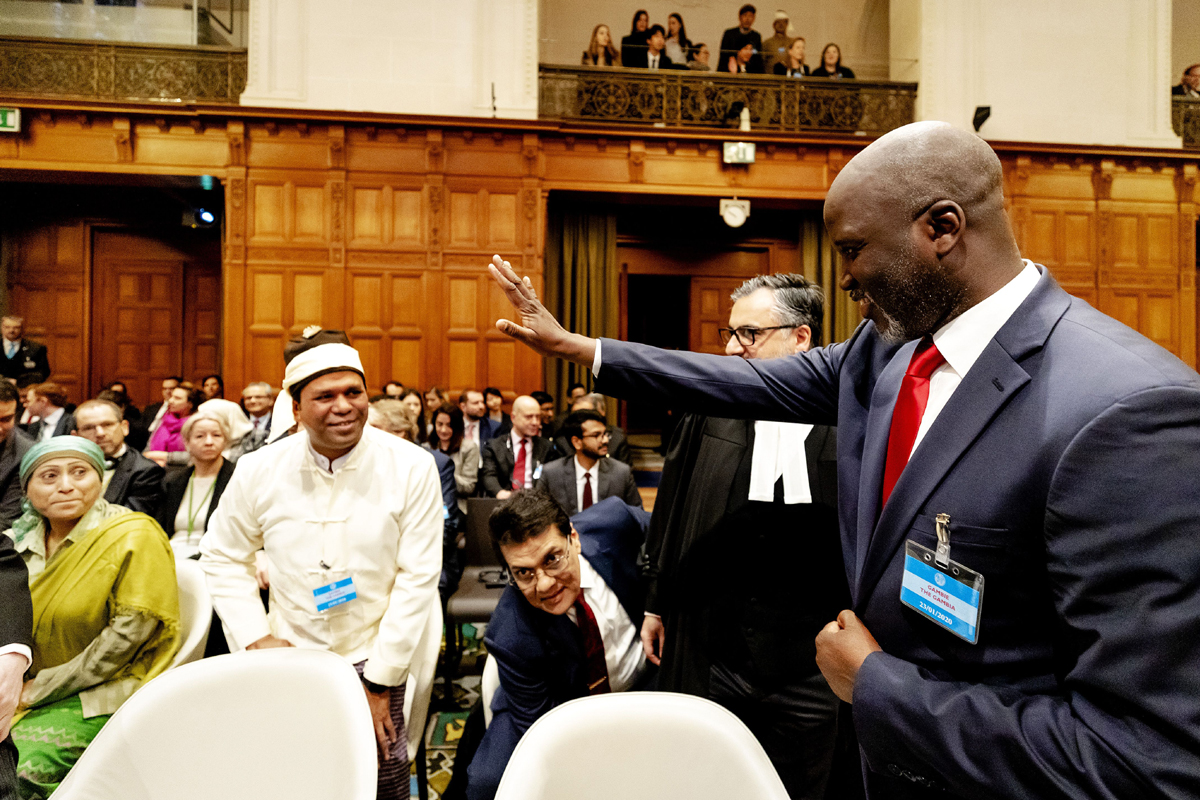Election Farce
Four years after seizing power in a coup, Myanmar’s military rulers continue their desperate yet failing bid to tighten their grip, this time by extending emergency rule under the pretext of preparing for elections.
Declaring that there was prima facie evidence of breaches of the convention, the court warned that the estimated 600,000 Rohingyas remaining in Myanmar were “extremely vulnerable” to attacks by the military.

Abubacarr Tambadou, Minister of Justice of The Gambia (R) waves to a representative of the Rohingya community prior to the ruling of the International Court of Justice in The Hague, on January 23, 2020 in the lawsuit filed by The Gambia against Myanmar in which Myanmar is accused of genocide against Rohingya Muslims. The UN's top court ordered Myanmar on January 23 to take "all measures within its power" to prevent alleged genocide against Rohingya Muslims. The International Court of Justice granted a series of emergency steps requested by the mainly Muslim African state of The Gambia under the 1948 Genocide Convention. (Robin VAN LONKHUIJSEN / ANP / AFP)
The Rohingyas have won and Myanmar has lost. Yet the cruel irony might persist for some time yet. Those responsible for genocide are still in power in Myanmar. Justice has been delayed but can no longer be denied. The military-dominated government in Naypidaw has been indicted as never before in the history of the embattled country.
Thursday’s judgment of the International Court of Justice at The Hague ~ the highest court of the United Nations ~ is as momentous as it is unanimous. Through the imposition of what it calls “provisional measures” on Myanmar, the court has instructed the government, nominally helmed by Aung San Suu Kyi, to respect the certitudes of the Genocide Convention of 1948.
Advertisement
Declaring that there was prima facie evidence of breaches of the convention, the court warned that the estimated 600,000 Rohingyas remaining in Myanmar were “extremely vulnerable” to attacks by the military. Trashed is the spirited defence of the government by the widely perceived icon of democracy in course of her personal appearance before the ICJ last December.
Advertisement
Her arduous struggle for democracy has turned out to be an exercise in shambolism not the least on account of her failure to come to the aid of the persecuted Rohingyas against the omnipotent junta. Well and truly has the junta been rapped on the knuckles. Myanmar has been ordered by the United Nations’ highest court to prevent genocidal violence against its Rohingya Muslim minority and preserve any evidence of past crimes.
Viewed through the legal prism, the watershed pronouncement at The Hague has rejected Suu Kyi’s defence of her country’s military. Myanmar is on the mat with the resounding victory of the “nowhere men”. Even the judge nominated by the government for the hearing voted against the country. The provisional measures imposed by the court require the government to prevent genocidal acts, ensure that military and police forces do not commit genocide, preserve evidence of genocidal acts, and report back on its compliance within four months.
The orders are automatically sent to the UN Security Council, where Myanmar’s response will be assessed. At the end of the day, the world must give it to Gambia, which brought the case to the ICJ. The complaint was the first attempt to use the international justice system to help the Rohingyas. The government of Myanmar has its back to the wall. So too does Aung San Suu Kyi, whose strained defence of the junta and human rights violations have been perilously skewed. Thursday was a historic day as much for the Rohingyas as for international law.
Advertisement